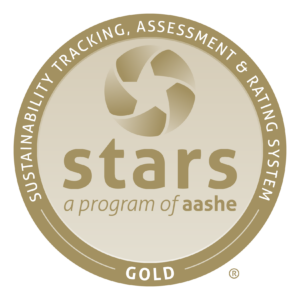SOU Institute for Applied Sustainability celebrates with Innovation Fund kickoff
Southern Oregon University’s Institute for Applied Sustainability is stepping into its second year with the official launch of its IAS Innovation Fund and recognition of the institute’s many first-year accomplishments. The Innovation Fund, which provides micro-grants for forward-thinking projects by SOU faculty and staff, is an example of the IAS commitment to creative and collaborative solutions at SOU and within the community.
Innovation Fund micro-grants foster sustainability and serve as strategic investments, laying the groundwork for broader funding opportunities and supporting initiatives that contribute to the long-term success of SOU sustainability efforts.
The impact of the Innovation Fund is already evident in recent projects that have received funding:
- Recology Artist in Residency p With the creative support of project lead Michael Parker, an SOU sculpture professor, this project helps students learn about transforming waste into art. The award-winning initiative encourages artists to use materials found at the dump, promoting sustainability and waste awareness. The resulting artworks enrich the community and shed light on hidden waste processes.
- DMC lighting project. This project takes a holistic approach to sustainability in overhauling lighting in the Digital Media Center studio, offering efficiency gains and cost savings for the university. It also enhances student education by providing exposure to industry-standard technology. The effort was spearheaded by Brandon Givens with support from the DMC, Sustainability Office and Oregon Center for the Arts.
- Carbon value research project. The project, led by Environmental Science, Policy and Sustainability professor John Gutrich, models the economic value of forest carbon for management strategies in the Pacific Northwest. It will foster collaboration between SOU’s ESPS program, the H.J. Andrews Experimental Forest Long-Term Ecological Research Program and the Department of Forest, Ecosystems and Society at Oregon State University.
- Bee research. Joy McEwen, coauthor of “Raising Resilient Bees,” has joined the team at The Farm at SOU to pioneer research on the impact of bees on soil production and quality. The research project is kicking off just in time for the groundbreaking of The Farm’s pollinator gardens this winter.
The SOU Institute for Applied Sustainability was created in fall 2022 as part of an historic, $12 million gift to SOU from Lithia Motors and its GreenCars division. The two largest elements of the gift are a $5 million scholarship fund and $4 million to establish the Institute for Applied Sustainability, which collaborates with Lithia on projects including a sustainability conference, an academic credential in corporate sustainability and a national sustainability demonstration site.
Learn more about the Institute for Applied Sustainability and its Innovation Fund.
“The inaugural year of the IAS has further exemplified Southern Oregon University’s commitment to sustainability,” said Becs Walker, SOU’s director of sustainability and associate director of the Institute for Applied Sustainability. “The IAS is building capacity for projects, internships and collaboration with businesses and organizations to provide our students with experience and learning in an area that is critical for the future.”
The IAS is celebrating both the accomplishments of its first year and the dedication of its faculty fellows: Pavlina McGrady, an associate professor of business; Bret Anderson, an associate professor and chair of history, economics and politics; Jessica Piekielek, a professor and chair of sociology and anthropology; and Chris Lucas, an assistant professor of digital cinema. The faculty fellows have helped build the institute’s foundation while pursuing projects within the IAS such as Digital Leaders Active in Disaster, Sustainable Tourism Training and SOU Collaborative Sustainability Archives.
“Kira Welch, the new full-time coordinator, will enhance the IAS’s capacity to engage in leadership, scholarship and teaching in the broad field of sustainability, both on- and off-campus,” said Vincent Smith, director of SOU’s School of Science and Business, and director of the IAS. “Our 2023-24 projects include on-campus sustainable landscape upgrades, regional partnerships, a global exchange program, faculty research and student internships.”









 “It is an honor for SOU to be recognized for its contributions to heal and preserve our environment,” SOU President Rick Bailey said. “Achieving the ‘Gold’ level is a huge accomplishment that reflects our commitment to sustainability.
“It is an honor for SOU to be recognized for its contributions to heal and preserve our environment,” SOU President Rick Bailey said. “Achieving the ‘Gold’ level is a huge accomplishment that reflects our commitment to sustainability.
